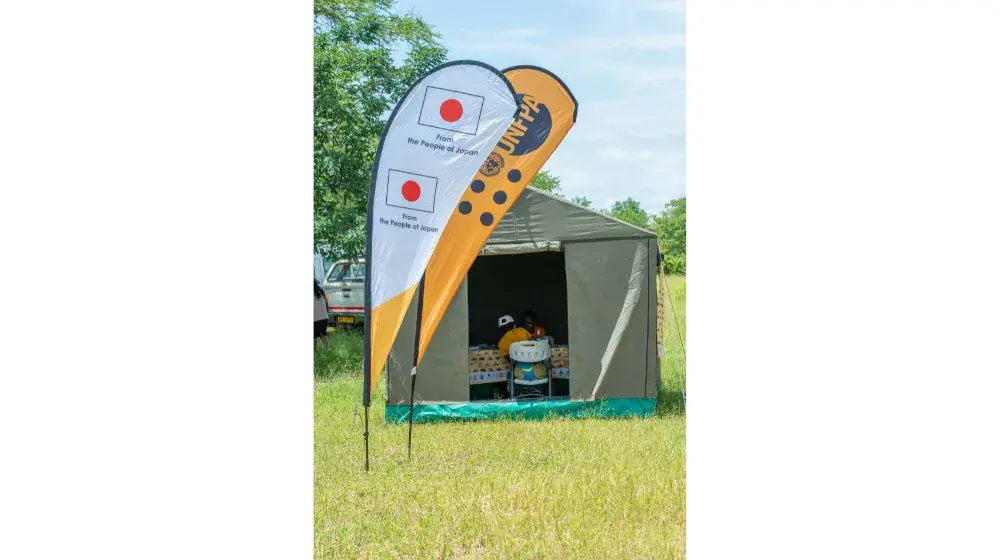Property grabbing is another form of violence that is rearing its ugly head, threatening the security and economic security of women including in Zimbabwe. In Umzingwane District, World Vision has noted that when women are forced from their properties, it is often accompanied by further acts of violence against them, including physical and emotional abuse. Widows are particularly vulnerable and defending their property has cost some their lives, shelter and sources of livelihoods, leaving them destitute. The harassment and humiliation that often accompany property grabbing further strip women of their self-esteem, affecting their ability to defend their rights.
56 year-old *Nobuhle Mlalazi of Umzingwane District narrates how she lost her property and home to her step son after her husband passed away in 2019. Nobuhle suffered mental and psychological abuse at the hands of a child that she literally brought up as her own, as she fought for what belonged to her. The inheritance claims resulted in continuous squabbles within the family. Her husband’s relatives defended their cultural heritage that gives the deceased’s estate to the first or last born male. Nobuhle continued to suffer verbal abuse accused of being a witch and a prostitute for defending her matrimonial home. Her step son somehow obtained an eviction order that saw her and her minor grandchildren lose her home of 25 years.
However, not giving up, the tormented widow turned to the village head, Dube who is known for his unwavering stunt towards Gender Based Violence and is passionate about protecting abused women and girls. The village head is one of the traditional leaders who was sensitised on GBV by a local Behavior Change Facilitator (BCF) at the inception of the Spotlight Initiative in 2019. Dube has sensitized and supported his community on GBV issues and this empowered the community to rally behind Nobuhle in reclaiming her home back. With the village head and behavior change facilitator’s support, the community put money together for her to access legal services and gave her a head start to challenge the eviction order. With this support, Nobuhle won her case and a protection order was served against the step-son.
Rudo Tinarwo, World Vision Behaviour Change Coordinator in Matabeleland South, says certain cultural practices are being used to perpetuate abuse against women.
“This culture has seen many widows in the community losing homes and property to either their husbands’ sons, uncles or siblings. Within The Spotlight Initiative supported interventions, the World Vision team in Umzingwane has identified BCFs who conduct sensitization sessions in communities with the aim to influence and bring about positive behavior change and adoption of gender sensitive norms, values and attitudes,” Rudo says.
Nobuhle is grateful for this intervention, “I am very grateful for this ‘light’ (Spotlight) Program that has educated my community on speaking against abuse of widows. I have been liberated,” she says with a winning smile.
The United Nations Population Fund (UNFPA) under the Spotlight Initiative, a global European Union funded project, is supporting World Vision to implement the community based Social Behaviour Change Communications (SBCC) initiatives to address GBV, Sexual Gender Based Violence and improve access to Sexual Reproductive Health and Rights services. District multi-sectoral stakeholders, including community leaders, convened in 2019 and developed the district’s GBV prevention strategy. One of the key strategies for Umzingwane is to engage community leaders as champions within their communities, and sensitizing them on their context specific GBV issues, as key issues vary from community to community. The role of local leaders, supported by BCFs, is also crucial in addressing GBV cases as they support survivors through the GBV referral pathway, and reduce further harm.
In Umzingwane District, more women like Nobuhle are now empowered to prevent and identify GBV, seek services early, report and seek follow up support, thanks to the intervention of the Spotlight Initiative sensitization sessions. Community leaders like Village Head, Dube have played a leading role in reminding communities to seek support when they experience any form of GBV.
Rudo says there is an increase in the number of people and survivors opening and reporting GBV, increased collaboration by community safety nets in handling GBV cases, and traditional leaders taking a leading role in anti GBV campaigns.
This article was first published in the Spotlight Initiative bi-weekly newsletter.
*Not her real name





